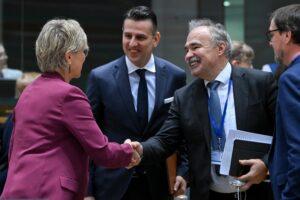The European Union does not want to find a solution to the issue of Ukrainian grain
According to István Nagy, the European Union does not want to find a solution to the issue of Ukrainian grain, so the Hungarians have no choice but to “negotiate with the leaders of the farmers’ interest protection organizations and express our solidarity with the European farmers and stand together to protect our interests”.

(Photo: AM)
István Nagy said in a statement given to MTI at the press conference after the meeting of the ministers responsible for agriculture and fisheries of the EU member states in Brussels: the farmers’ demonstrations across Europe indicate that the ideologically over-politicized agriculture is unsustainable for farmers. “If we break the triple unity of competitiveness, preservation of the quality of our created world and food security, then the system will not be sustainable. The farmers’ demonstrations draw attention to the fact that access to agricultural subsidies is too difficult, and by prioritizing the interests of Ukraine, European farmers they feel that they don’t get enough protection, and with the outsourcing of their market, a situation arises that threatens their daily livelihood,” he pointed out. The EU would still leave its borders open to trade, and Hungary would also have to allow Ukrainian grain in, which is unacceptable, he said. He reported that he consulted with EU Commissioner Valdis Dombrovskis, and they came to the conclusion that Hungary should conclude a bilateral agreement with Ukraine, which would mean that the Ukrainian side would not send, and Hungary would not receive grain. He drew attention to the fact that, on the one hand, the original purpose of the solidarity corridors must be immediately restored, so that the products can reach the needy third countries in the Middle East and Africa, and on the other hand, the agricultural producers of the member states neighboring Ukraine need EU protection. “I don’t see any other option than to reduce the quotas to sensitive products. In addition, the market for products where the association agreement did not contain quotas must also be protected,” he declared. He pointed out that the Hungarian government is closing its borders to Ukrainian grain under its national authority, which may result in infringement proceedings. However, for Hungary, the interests of Hungarian farmers are primary – he emphasized.
István Nagy also touched on the fact that, according to the information on the website of the Ukrainian Ministry of Agriculture, the production of the majority of field crops in the country is unprofitable, especially in the case of small and medium-sized farmers.
“Therefore, the question rightly arises as to whether the joint European assistance provided with full market opening will achieve its goal. While the farmers of the bordering member states are in an increasingly difficult situation, the benefit of Ukrainian exports is not Ukrainian farmers, but traders and foreign owners of large estates hands, and the products do not reach third countries in need,” he explained. The Minister of Agriculture emphasized that the approach must be changed in order for Europe to be able to produce for itself in the long term and to process its locally produced products. “It is unsustainable that Europe imports from third countries, while its own producers have to stop production,” he underlined. According to his opinion, a well-functioning and ambitiously financed common agricultural policy is the most important prerequisite for farmers to continue to guarantee food security. The first priority is a fair income for farmers, and great emphasis must be placed on generational renewal, since the aging of the farming community is still an unsolved problem in Hungary and the European Union, he added.
He also mentioned sustainability and the contribution of the agricultural sector to the fight against climate change as a priority topic
He highlighted: taking into account the experience of the common agricultural policy, it is necessary to discuss how farmers can contribute to the green goals, without negatively affecting competitiveness and food security. “A stable, predictable, farmer-friendly and better regulated support system is needed, which encourages farmers to achieve common goals and promote the green transition. Reasonable and achievable conditions must be set that create a balance between the aspects of competitiveness and sustainability,” he emphasized. István Nagy also pointed out that the safety net and crisis management tools of the common agricultural policy must be developed so that they are truly able to help farmers overcome crises.
MTI
Related news
Related news
GDP growth in OECD member countries slowed to 0.3 percent in the last quarter of last year
🎧 Hallgasd a cikket: Lejátszás Szünet Folytatás Leállítás Nyelv: Auto…
Read more >Change in Rossmann Hungary’s leadership: Kornél Németh decided to move towards new challenges in 2026
🎧 Hallgasd a cikket: Lejátszás Szünet Folytatás Leállítás Nyelv: Auto…
Read more >







